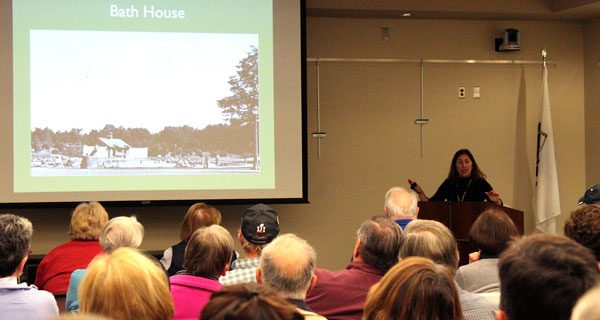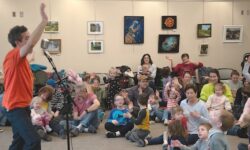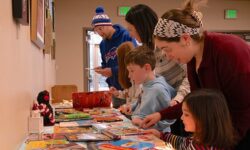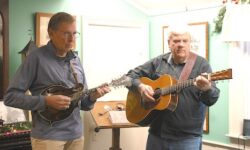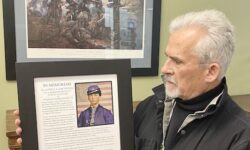[ccfic caption-text format="plaintext"]
By Laura Drinan
Hometown Weekly Reporter
Since it opened in 1925, Bird Park has secured a spot in the hearts of those who grew up and lived in and around Walpole.
There are many who still remember the swimming pool that opened for the hot summers before it was transformed into one of the ponds that houses the park’s aquatic life.
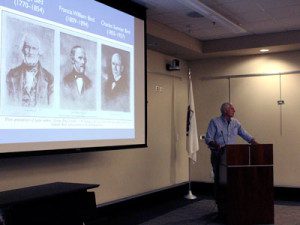
Grandson of Francis William Bird, Frank Phillips, discusses his family’s history in Walpole and the creation of Bird Park.
Others think of the manicured lawns that served as a beautiful backdrop for their Walpole High prom photos.
Some children recall Bird Park as the place they learned to ditch the training wheels on their bicycles and ride through the trails on their “big kid” bikes.
While we all have our own history with Bird Park, there is, of course, the story of the park itself. The Trustees of Reservations, partnering with the Walpole Historical Society, welcomed Frank Phillips, the grandson of Francis William Bird, to the Walpole Public Library to discuss his family’s history in town.
Phillips traced one Bird, Andrew, back to the 1760s. Andrew Bird came to Massachusetts from Scotland and married a ship captain’s daughter, with whom he had one son, George, who began the Birds’ mill business. Generations later, Charles Sumner Bird, Sr. assumed control of the business. With his wife, Anna, Charles Sumner had a son named Francis William, who went on to befriend Theodore Roosevelt in the world of politics.
The land that Bird Park occupies now was originally to be developed as housing for Charles Sumner’s Bird & Son employees. John Nolen, who designed the property, attempted to merge city and farm life by incorporating gardens and lawns into the housing plan.
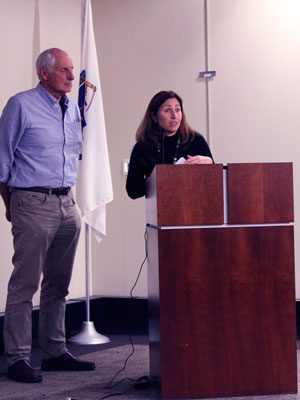
Frank Phillips and Maura O’Gara collaboratively answer audience members’ questions regarding Bird Park and the Bird family.
Nolen aimed to create a “sequestered breathing place – a combination of broad, sun-swept meadow lands, speckled with shadowed glades, higher tree-screened knolls for the lover of shade, the whole set to the music of a babbling stream.”
As Phillips, dubbed the family historian by another Bird family member, discovered, the Birds were unlike many other business-owning families.
“I found out that they were very, very progressive people, who really did some very interesting things in their lives,” said Phillips. “They were on the cutting edge of all of those issues in the 19th and early 20th century. They were also committed to the town, and the debates about where to locate the schools, where the rail lines should run, and land conservation was a big issue. All the while, they were creating and expanding what was, initially, a simple, little paper mill on the Neponset River.”
After Francis William’s death due to influenza, Charles Sumner and Anna decided to dedicate the land to their late son and make it a public park.
“The park was intended to mimic New England landscapes and to capture the essence of the New England meadow, the New England woodlands, the New England pond, and the New England seashore,” said Maura O’Gara of the Trustees, as she showed various photos of Bird Park.
“The meadows, the woodlands, the ponds were all intended to provide a spiritual uplift of nature. Places like the pool, the music court, the sports courts, and Vista Field were all purposefully designed to provide more formal, organized activities, which both Nolen and Bird firmly believed provided terrific societal benefits.”
For all of those who visit Bird Park, they think of it as an outdoor haven – a place to relax and enjoy nature in the midst of suburbia.
“Even though the park’s uses have definitely changed over time,” said O’Gara, “[it] continues to play an absolutely vital role in the health and happiness of the local residents, and that’s exactly what Nolen and Bird had intended.”





